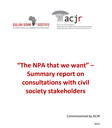Having a cabinet member with an exclusive focus on the police has had at least four immediate adverse consequences, argues Lukas Muntingh. He asks if it is time for an evaluation of this role.
ACJR Publications
A decline in disciplinary actions does not mean that the police are more disciplined than before

This presentation was made at a webinar on The NPA that we want, 17 October 2022.

Much of the media attention given to the National Prosecuting Authority (NPA) is centered on high-level corruption investigations, especially linked to the Zondo Commission’s findings and recommendations. While this is important, it should also be asked what happens at ground-level in our courts where ordinary cases are heard on a daily basis. The question can indeed be asked: What are our expectations of the NPA when having to engage with the criminal justice system as a victim, witness or even an accused? Do we know what we want from the NPA in real and practical terms? In June and July 2022 ACJR commissioned a series of consultation workshops with stakeholders to discuss these questions and develop descriptions of “the NPA that we want”. The consultations yielded valuable observations and insights, demonstrating on the one hand that people generally have a deep understanding of the challenges facing the NPA and, on the other hand, clear understandings of what they expect of the NPA, especially as these relate to the four core values of professionalism, independence, accountability, and credibility.




This article explores the nature and causes of prisoner protests, looking at it first from a sociological perspective and second, a rights perspective. The fact that people end up in prison following due process does not mean that their imprisonment is not a contested arena in the sense that prisoners are generally aware of their rights, even when curtailed. Importantly, this curtailment has boundaries - prisoners do not lose all their rights and it seems that this particular issue is frequently the locus of tension, and sometimes conflict, between prisoners and prison administration. There is nothing in South African law prohibiting prisoners from protesting as recognised by s 17 of the Bill of Rights. However, prisoners, with reference to the right to free speech and the right to peaceful demonstration, find themselves in a situation where they can claim these rights, but the enabling legislation is not only lacking, but there are strong indications that the operational procedures prevent them from exercising these rights. Muntingh, L (2022) Prison protests in South Africa: A conceptual exploration, SA Crime Quarterly, No. 71 (2022)
In December 2020, the Constitutional Court confirmed the order of constitutional invalidity made by the Western Cape High Court in Sonke Gender Justice NPC v President of the Republic of South Africa and Others regarding certain provisions of the Correctional Services Act dealing with the independence of the Judicial Inspectorate for Correctional Services. The Court gave Parliament two years to rectify these issues; an approach that has been used previously by the Court. The two-year period will lapse on 3 December 2022, which is less than three months into the future. The Detention Justice Forum calls on all relevant state actors to make public the plan for meaningful public participation on the draft Bill and all steps necessary to ensure that the Sonke decision is substantively given effect to.
The Impact of COVID-19 on Prison Conditions and Penal Policy presents the results of a worldwide exchange of information on the impact of COVID-19 in prisons. It also focuses on the human rights questions that have been raised during the pandemic, relating to the treatment of prisoners in institutions for both juveniles and adults worldwide. Muntingh, L (2022) ‘South Africa’ IN Dünkel, F., Harrendorf, S. and Van Zyl Smit, D. (eds) The Impact of Covid-19 on Prison Conditions and Penal Policy, Routledge.

This report makes a number of overview observations dealing with broader issues of governance, human rights, the socio-economic impact of the COVID-19 pandemic and the criminal justice system. A central lesson to be taken from these findings is the need for continued vigilance in seeking a balancing of rights and the importance of evidence-based policy-making, especially where there is the potential that those already socio-economically vulnerable may be pushed deeper into poverty. Report by L Muntingh, J Mangwanda & K Petersen

Report by J Mangwanda & K Petersen (2022)

Report by K Petersen and J Mangwanda (2022)

Report by T Lorizzo and V Petrovic (2022)
